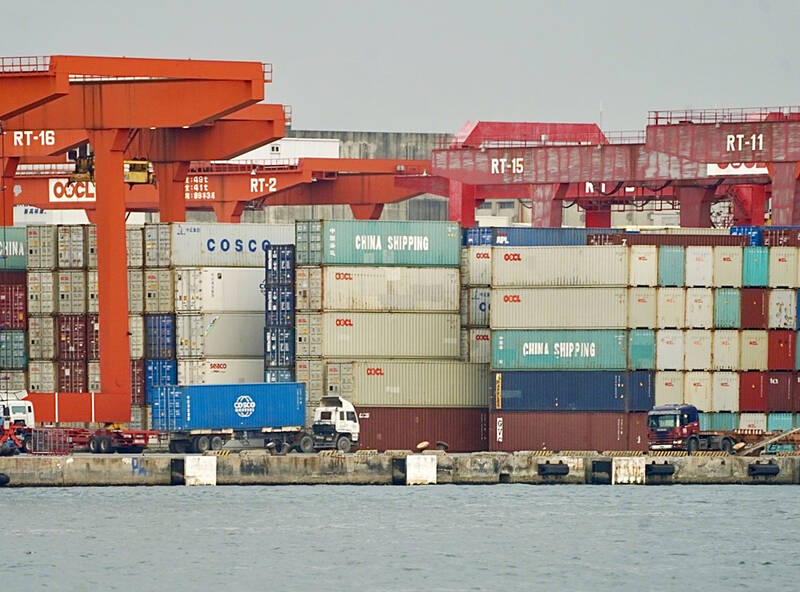Cathay Financial Holding Co (國泰金控) yesterday trimmed its economic growth forecast for the nation for this year to 3.2 percent, down from the 3.4 percent it predicted in June, amid signs that exports would lose steam in the fourth quarter.
“Last month, exports reported an annual growth of merely 2 percent, which is a sharp drop from the double-digit increases during the first seven months of the year,” National Central University economics professor Hsu Chih-chiang (徐之強) told an online news conference.
Hsu heads a research team commissioned by Cathay Financial.

Photo: CNA
SLOWING ORDERS
Meanwhile, export orders rose at a slower pace last month and totaled only US$54.59 billion, compared with peak of US$62.7 billion in March, Hsu said.
“These signals have prompted concern that exports might slow down in the fourth quarter. Growth could remain in the positive territory, but it would not be double-digit percentage gains,” he said.
The conservative outlook on exports could lead to local makers holding off on new investments, another key reason that Cathay Financial cut its forecasts, he said.
“Imports of capital equipment and semiconductor equipment fell 2.2 percent and 6 percent year-on-year respectively last month, indicating that domestic investments would decelerate in the following months,” Hsu said.
Domestic investment is a major pillar of the nation’s economy, contributing about 70 percent to the first half’s GDP growth of 3.4 percent, Hsu said.
Cathay Financial forecast that the economy would expand 2.7 percent next year, as weak demand might continue to exert pressure on exports and domestic investment.
PRIVATE SPENDING
However, private consumption could rebound strongly because of a low comparison base this year and relaxation of disease prevention measures, Hsu said.
The central bank is expected to further raise its policy rate when it meets in December to contain inflation, he said.

PATENTS: MediaTek Inc said it would not comment on ongoing legal cases, but does not expect the legal action by Huawei to affect its business operations Smartphone integrated chips designer MediaTek Inc (聯發科) on Friday said that a lawsuit filed by Chinese smartphone brand Huawei Technologies Co (華為) over alleged patent infringements would have little impact on its operations. In an announcement posted on the Taiwan Stock Exchange, MediaTek said that it would not comment on an ongoing legal case. However, the company said that Huawei’s legal action would have little impact on its operations. MediaTek’s statement came after China-based PRIP Research said on Thursday that Huawei filed a lawsuit with a Chinese district court claiming that MediaTek infringed on its patents. The infringement mentioned in the lawsuit likely involved

Taipei is today suspending work, classes and its US$2.4 trillion stock market as Typhoon Gaemi approaches Taiwan with strong winds and heavy rain. The nation is not conducting securities, currency or fixed income trading, statements from its stock and currency exchanges said. Authorities had yesterday issued a warning that the storm could affect people on land and canceled some ship crossings and domestic flights. Taiwan Semiconductor Manufacturing Co (TSMC, 台積電) expects its local chipmaking fabs to maintain normal production, the company said in an e-mailed statement. The main chipmaker for Apple Inc and Nvidia Corp said it has activated routine typhoon alert

GROWTH: TSMC increased its projected revenue growth for this year to more than 25 percent, citing stronger-than-expected demand for AI devices and smartphones The Taiwan Institute of Economic Research (TIER, 台灣經濟研究院) yesterday raised its forecast for Taiwan’s GDP growth this year from 3.29 percent to 3.85 percent, as exports and private investment recovered faster than it predicted three months ago. The Taipei-based think tank also expects that Taiwan would see a 8.19 percent increase in exports this year, better than the 7.55 percent it projected in April, as US technology giants spent more money on artificial intelligence (AI) infrastructure and development. “There will be more AI servers going forward, but it remains to be seen if the momentum would extend to personal computers, smartphones and

Catastrophic computer outages caused by a software update from one company have once again exposed the dangers of global technological dependence on a handful of players, experts said on Friday. A flawed update sent out by the little-known security firm CrowdStrike Holdings Inc brought airlines, TV stations and myriad other aspects of daily life to a standstill. The outages affected companies or individuals that use CrowdStrike on the Microsoft Inc’s Windows platform. When they applied the update, the incompatible software crashed computers into a frozen state known as the “blue screen of death.” “Today CrowdStrike has become a household name, but not in